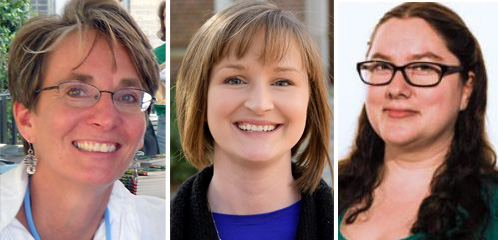Project READY releases free online racial equity curriculum for youth services librarians
After three years of collaboration, investigation, and development, researchers at the UNC School of Information and Library Science (SILS) have released a free online curriculum to help youth services library staff learn to create more inclusive and equitable programming. Accessible at ready.web.unc.edu, the curriculum is the culmination of Project READY (Reimagining Equity and Access for Diverse Youth) and represents the work of more than 40 scholars, library and school practitioners, and youth from a wide variety of racial and cultural backgrounds.

SILS, the School of Library and Information Sciences at North Carolina Central University, and the Wake County Public School System (WCPSS) received a grant from the Institute of Museum and Library Services (IMLS) for Project READY in 2016. The project aimed to create new professional development opportunities that could enable youth services librarians to better serve their increasingly diverse populations. While the majority of students in U.S. public schools are now Black youth, Indigenous youth, and Youth of Color, research has shown that only a small percentage of librarians have received formal training that addressed race and racism, implicit bias and microaggressions, cultural competence and culturally sustaining pedagogy, and equity and social justice.
SILS Professor Sandra Hughes-Hassell and Teaching Assistant Professor Casey Rawson led Project READY as Principal Investigator and Co-PI and developed the online curriculum with SILS doctoral student Kimberly Hirsh.
During the 2017-18 school year, researchers worked with school librarians, literacy coaches, and classroom teachers from WCPSS to implement and evaluate an initial version of the curriculum. The partnership made such a positive impact, Project READY received the UNC-Chapel Hill Provost Engaged Scholarship Award.
The face-to-face workshop and subsequent interactions with WCPSS participants helped the curriculum development team realize they needed to expand the scope of their plans.
“We had anticipated taking the five days that we did in Wake County and putting that content online,” Rawson said. “What we have is 10 times that, at least.”
To create a more comprehensive experience, the team reached beyond its initial partners by convening an advisory board and recruiting external reviewers. The finalized curriculum consists of 27 modules, designed to be worked through by individuals or small groups. While it can be beneficial for colleagues to work through the program together, the original concept of a short-term workshop for entire organizations had to be abandoned, Hughes-Hassell said.
“This isn’t content that you can drop on people in five days and have them know what to do next,” said Hirsh, who also emphasized this should not be used as a “train the trainer” program. “That’s one of the reasons that the online program is so expansive. You have to walk people through the process of their own growth and what to do next; how to take the abstract concepts that they’re learning about and apply them in their own professional environments.”

The curriculum includes several actions that can help participants as they progress, such collecting data on their library’s current environment, setting a series of short-term and longer-term goals to make their programming and space more equitable and inclusive, and “images of practice,” video and written examples of how other practitioners have implemented these concepts.
Hughes-Hassell, Rawson, and Hirsh are now busy promoting the curriculum through social media, professional organization listservs, and conference presentations. They’ll be at booth 2650 at the American Library Association’s annual conference in Washington, D.C., in late June.
Related Research Areas: Equity and Inclusion
